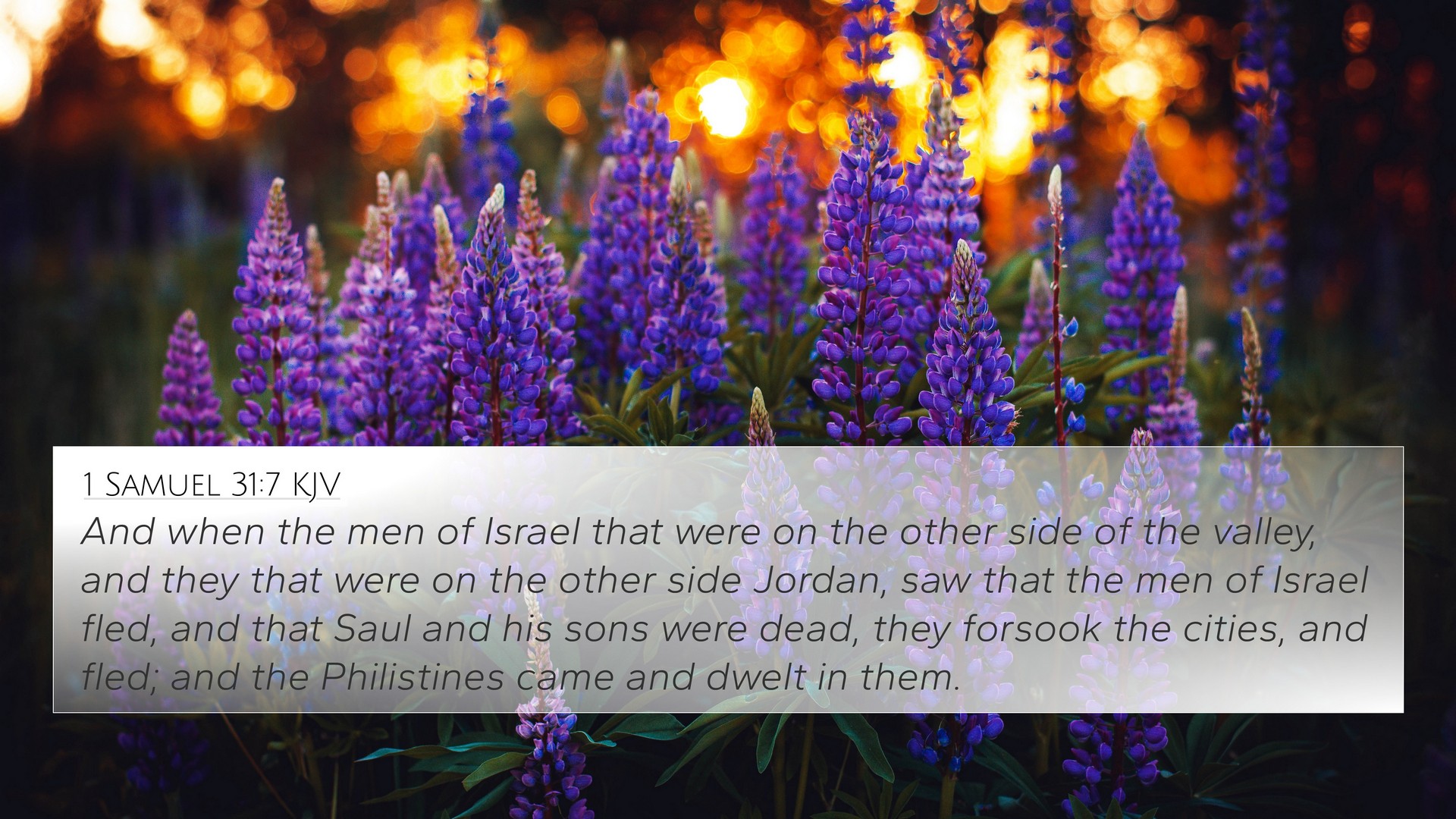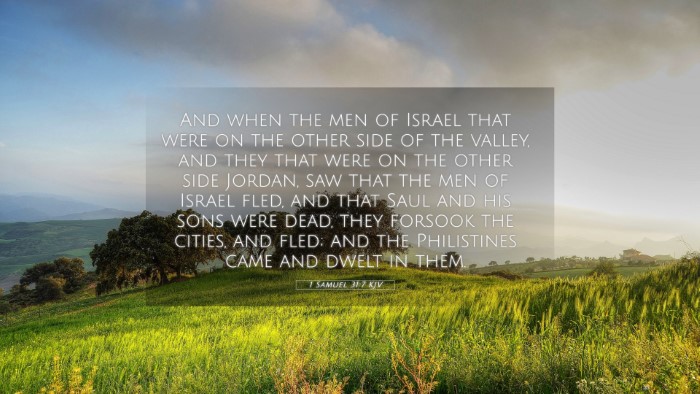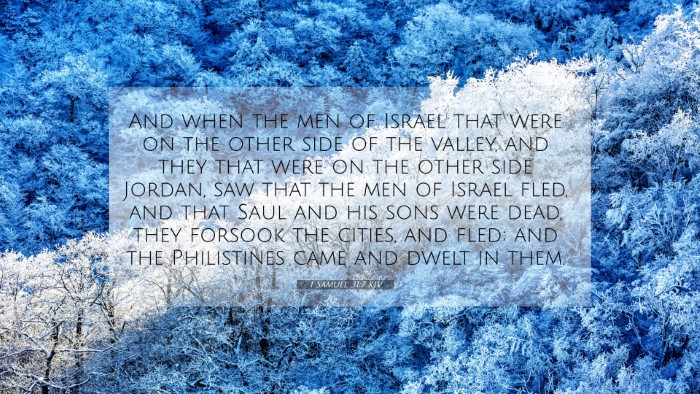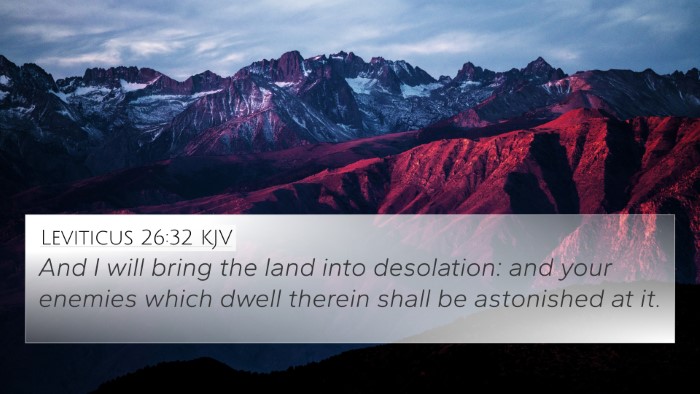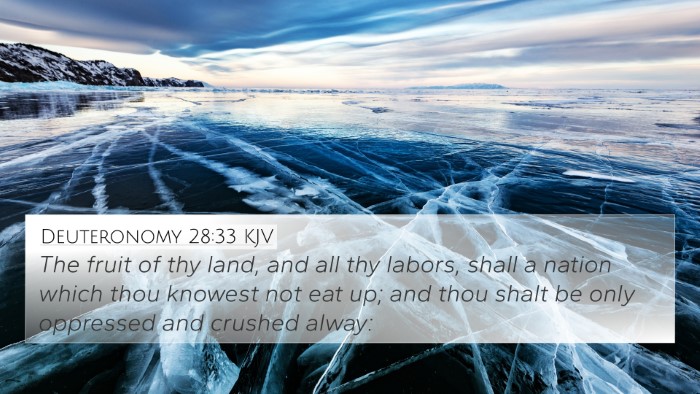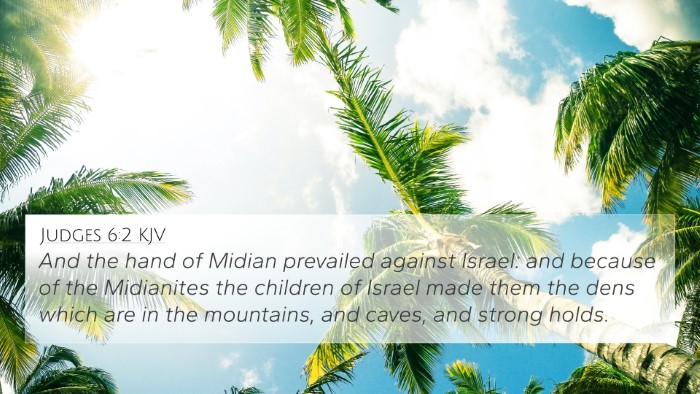Understanding 1 Samuel 31:7
1 Samuel 31:7 states: "And when the men of Israel that were on the other side of the valley, and they that were on the other side Jordan, saw that the men of Israel fled, and that Saul and his sons were dead, they forsook the cities, and fled; and the Philistines came and dwelt in them."
Summary of the Verse
This verse reveals the aftermath of the battle in which King Saul and his sons died. The Israelite soldiers, witnessing their king's defeat, fled from their cities in fear, leaving them vulnerable to the Philistine invaders. This reflects a significant turning point in Israel's history, marking the end of Saul's reign and the beginning of Philistine dominance.
Interpretations from Public Domain Commentaries
Matthew Henry's Commentary:
- Henry comments on the despair that overwhelmed the Israelites upon learning about Saul's death. It indicates the collapse of the Israelite morale and unity, emphasizing how the loss of their leader led to chaos.
- He also highlights the abandonment of their cities as a sign of defeat, indicating a lack of faith and trust in God’s protection when faced with adversity.
Albert Barnes' Notes:
- Barnes reflects on the emotional impact of Saul and his sons' deaths, observing that the fear induced by their defeat caused a mass exodus of the Israelites from their fortified cities.
- He points out the strategic implications for the Philistines, who took immediate advantage of this vacated territory, showcasing their opportunism in warfare.
Adam Clarke's Commentary:
- Clarke emphasizes the slow decay of Saul’s and Israel’s authority, signaling how the abandonment of the cities not only represents a military loss but a spiritual decline as well.
- He also notes that this event has profound theological implications, tying it to God’s judgment on Israel for their rejection of divine leadership.
Bible Verse Cross-References
This verse can be cross-referenced with the following Biblical texts to deepen the understanding of its themes:
- 1 Samuel 28:19: Highlights the prophecy about Saul's imminent downfall.
- 2 Samuel 1:11-12: David's lament for Saul signifies the impact of Saul’s defeat on the entire nation.
- 1 Chronicles 10:7: A parallel narrative that also describes the aftermath of Saul's death and the flight of the Israelites.
- Judges 6:8: Reflects how God raises up leaders to deliver Israel when they face oppression, contrasting Saul's failure.
- Psalm 9:6: Reflects on God’s justice in judging nations, connecting to the downfall of Saul and Israel.
- Isaiah 10:20-22: The prophetic warning that reflects the eventual return of the remnant of Israel after judgment.
- Romans 15:4: Emphasizes the importance of learning from the scriptures, applying this historical lesson to contemporary faith.
Thematic Bible Verse Connections
The events after Saul's death in 1 Samuel 31:7 can be viewed in several thematic contexts, linking several key themes:
- Leadership and Accountability: The verse illustrates how the nation's leadership impacts its people, a theme continued in the New Testament (see Hebrews 13:17).
- Fear and Despair: The initial panic reflects a failure to trust in God amidst crisis, emphasized in Matthew 6:25-34.
- Judgment and Prophecy: Saul's downfall is a direct consequence of disobedience to God, paralleling the warnings given in Jeremiah 11:11.
- Betrayal and Loyalty: The abandonment of cities raises questions of allegiance, thematic in the New Testament discussions of loyalty to Christ (see John 15:13).
Conclusion
1 Samuel 31:7 serves as a crucial reflection on the consequences of disobedience and the importance of godly leadership. By exploring various commentaries, we see the depth of the narrative and its impact on future events in Israel's history. The call for believers today is to remain steadfast in faith during trials, understanding the historical context of their scriptures. Through tools for Bible cross-referencing and comprehensive Bible study methods, we can uncover the interconnectedness of God's Word, enriching our understanding of both the Old and New Testaments.
